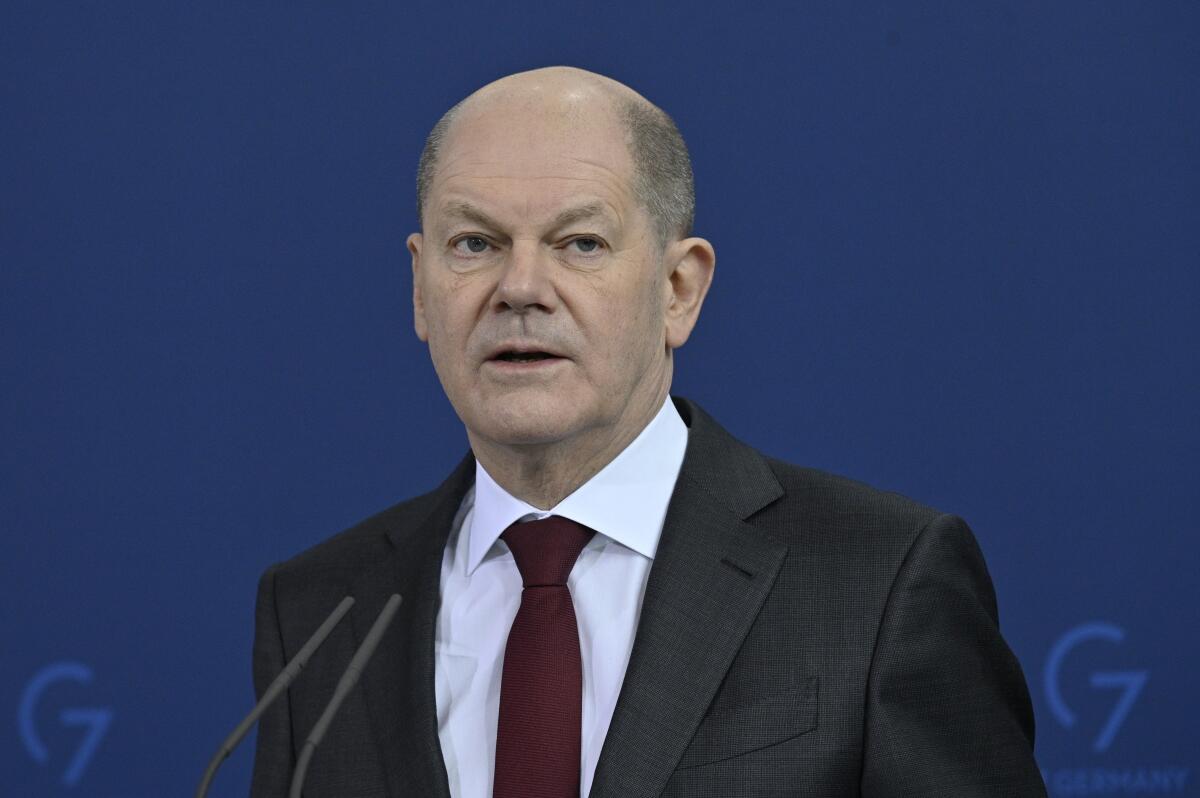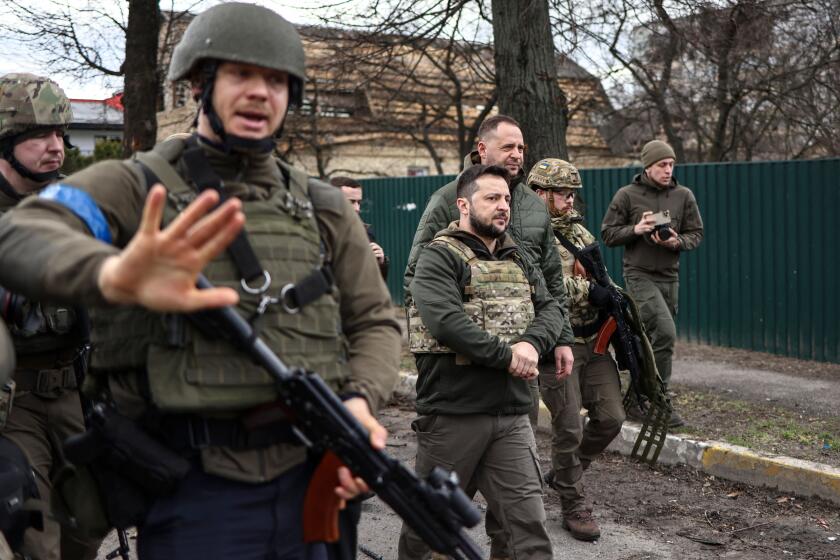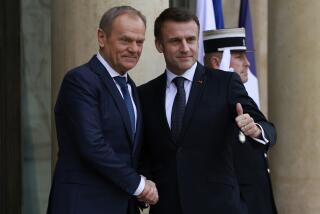Russian mobilization in Ukraine raises concerns about a new Cold War-style era in Europe

- Share via
BERLIN — Although Udo Grelzik spent almost half his life under communist rule in East Germany, he never anticipated the threat of anything like a new Cold War in Europe.
Those days were supposedly consigned to a shadowy epoch of the Berlin Wall, countless noirish thrillers and the daily proximity of nuclear Armageddon.
“I’m definitely scared now, because you never know what might happen once the fighting starts,” said Grelzik, 61, a renewable energy project developer who lives outside Berlin, the German capital. “What might begin as a regional fight could end up spreading fast. That’s the last thing that anyone in Germany or anywhere else wants.”
The threat of major war in Ukraine — accelerated by Russian President Vladimir Putin’s decision Monday to recognize the independence of two Ukrainian separatist regions — has sparked angst throughout Europe, more than three decades after the Cold War ended. The continent’s collective consciousness is wedged somewhere between fear and denial — with lots of blame tossed into the mix — as many view with dread the prospect of a region once again divided into Eastern and Western blocs.
A woman reacts as she stands in front of a house burning after being shelled in the city of Irpin.
The protracted East-West standoff after World War II and its attendant threat of a nuclear conflagration remain a not-so-distant memory to many in Europe. Although U.S.-Russian ties have become increasingly frayed in the post-Cold War era, the current Ukrainian crisis appears to have pushed matters to a near-breaking point.
“It’s very unsettling,” said Ian Shields, an associate lecturer at Cambridge University who spent three decades in Britain’s Royal Air Force and flew nuclear-armed training missions in the early 1980s. “From the European point of view, we should be very worried by this.”
Putin, said Shields, is accomplishing two key goals: beefing up his domestic popularity with nationalist pronouncements while driving a wedge through Europe.
“I think politically Putin is playing a very clever and very worrying game,” said Shields. “If we don’t respond sufficiently robustly, are we going to see literally a return to the Cold War, where you have areas around the world split into one or two camps?”
“Act of War,” blared the headline on Britain’s Sun newspaper describing Putin’s move, labeling the moment the most perilous international period since the Cuban missile crisis 60 years ago.
The declaration by Putin sparked vows of a new round of U.S. and European sanctions against Moscow, targeting businesses, wealthy Russians and the country’s financial services.
But perhaps the most consequential response was German Chancellor Olaf Scholz’s announcement Tuesday that he was suspending certification of the $11-billion Nord Stream 2 natural gas pipeline project, which runs from Russia to Germany.
Germany and much of Europe are heavily dependent on Russian natural gas. More than a third of the gas the 27-nation European Union uses to generate electricity and heat homes comes from Russia. That is one reason Berlin has sometimes been viewed as a reluctant partner in Washington’s bid to contain Moscow.
The German leader was cryptic in explaining why his government had moved to block the pipeline’s certification — a measure that Washington had long urged Berlin to wield against
Moscow. Authorities would “make a new assessment of the security of our supply in light of what has changed in the last few days,” Scholz said.
Others were less diplomatic.
Speaking Tuesday on the BBC, Gen. Richard Shirreff, Britain’s former top NATO commander, warned that the situation could devolve into “warfare on a scale not seen in Europe since 1945. I think it’s difficult to overstate the seriousness of the situation.”
In Paris, a French official told France 24 that the Russian leader’s declaration Monday was “rigid and paranoid,” and betrayed promises made to President Emmanuel Macron. The French leader spoke with Putin twice by telephone Sunday in a frenetic bid to reduce tensions and become perhaps Europe’s chief interlocutor with his Russian counterpart.
In Eastern European nations such as Poland and Hungary, once Soviet satellite states, officials were bracing for a possible influx of refugees from neighboring Ukraine. The former front-line states in the Cold War — and current members of the North Atlantic Treaty Organization — have no illusions about the potentially calamitous consequences of a war in Europe.
The Polish prime minister, Mateusz Morawiecki, condemned Putin’s action as “a crass violation of international law.”
Likewise, Italian Prime Minister Mario Draghi called Russia’s recognition of the two breakaway regions “an unacceptable violation of the democratic sovereignty and territorial integrity of Ukraine.”
Italy has long been viewed by many as soft on sanctions against Russia. Former Italian Prime Minister Silvio Berlusconi forged a close friendship with Putin, and Matteo Salvini, the hard-right populist leader and former interior minister, lavished high praise on Russia.
Germany, home to Europe’s largest economy, has also sometimes been seen in Washington as hesitant to go full throttle on sanctions against Russia, for various reasons — especially its dependence on Russian natural gas for energy needs and its many business ties with Russia. Also, there is a lingering sense of guilt among some Germans for the destruction inflicted on Russia in World War II.
Moreover, many Germans, especially in the former East Germany, believe that the West is largely responsible for the current unrest. They often cite Washington’s aggressive policy to push NATO expansion up to Russia’s borders, which Moscow views as a grave security threat.
“The problem is that the West hasn’t shown enough respect for Russia and its interests,” said Grelzik, who lived not far from a major Soviet base in the East before the Berlin Wall came down in 1989. “NATO expansion is the cause of all this right now. And the attitude that after the Cold War the West could do whatever it wanted. Putin felt he had to react and show strength.”
The devastation of World War II also left a profound pacifist strain in Germany. “Nie wieder Krieg” (Never again war) has been a popular slogan for decades, appearing on bumper stickers and elsewhere. Embracing the never-again-war goal are both survivors of the World War and its aftermath, and a younger generation that has only heard of the Cold War from elders or historical and dramatic accounts.
“Western political leaders had a lot of time to act more diplomatically and be a little more cautious toward the East,” said Stefan Marten, 40, a city manager in a Berlin suburb. “But it’s too late now.”
Like many other Germans, Marten said that he condemned Putin’s actions in Ukraine and that the Russian leader’s views on the rule of law and human rights are incompatible with Western norms. Still, Marten said the current crisis could have been prevented.
“Diplomatically, Russia needs to be treated like an equal — and that hasn’t been the case for many years,” Marten said. “That’s what led to the situation in Ukraine.”
Special correspondents Kirschbaum and Boyle reported from Berlin and London, respectively, and Times staff writer McDonnell from New York. Special correspondent Tom Kington in Rome contributed to this report.
More to Read
Sign up for Essential California
The most important California stories and recommendations in your inbox every morning.
You may occasionally receive promotional content from the Los Angeles Times.











